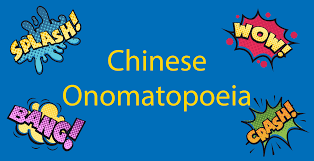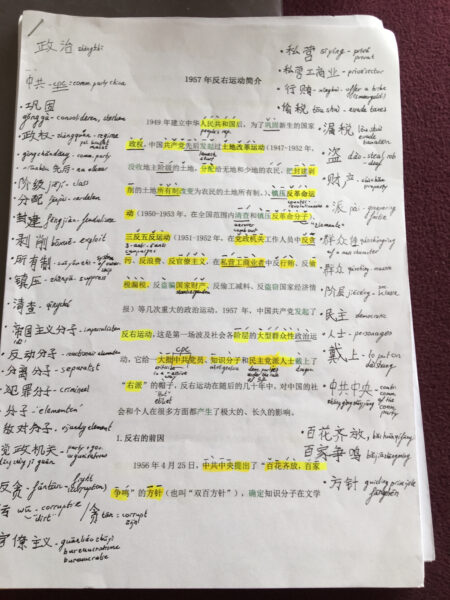Learning our native language is one of our earliest experiences that irreversibly shapes how we perceive the world. Did you know that your native language even shapes how you hear and interpret sounds? When you hear a loud dog, does it sound like it’s saying “bark” or “woof”? It’s probably because you learned from a young age that “the dog goes bark bark and woof woof.” If you grew up in China, you might have instead learned that the dog goes 汪汪 (wāngwāng).
Many of us are surprised to learn that the words for animal sounds, inanimate objects, or random vocalizations aren’t actually the same in each language. These onomatopoeia, simply defined as words that we use to imitate certain sounds, come in all different forms, and some may really surprise you.
When learning Chinese as a second language, people often treat onomatopoeia as unnecessary, not useful, or even childish. In reality, these simple sounds can add so much more color and dimension to your world. Plus, they’re a surprising amount of fun.
To give you a small glimpse into the vast amount of Chinese onomatopoeia out there, we’ve compiled a few short lists of words that we use to describe the sound of objects, animals, nature, and even people.
Bonus: Try to sound these out as you read them and add some gestures for even more pizzaz. Not only will you have a good laugh, but you’ll also commit them to memory more easily.
Chinese onomatopoeia – Object sounds
These sounds are all associated with inanimate objects and machines. If you look around your house, how many of these can you pick up on?
砰 (pēng) – Thump
唰 (shuā) – Swish, rustle
啪 (pā) – Pop, pow, bang
轰 (hōng) – Boom, bang
叮咚 (dīngdōng) – The sound of jingling or clattering, generally the sound of metal or porcelain objects clashing together
咔嚓 (kāchā) – Cracking or snapping
呱哒 (guādā) – Clip-clop, the sound of heels clicking on a hard floor
嘎吱 (gāzī) – Breaking or creaking due to heaviness
轧轧 (yàyà) – The sound of machinery running
刺溜 (cìliū) – Sliding
扑通 (pūtōng) – The sound when heavy objects land, or something falling into water
嘀铃铃 (dí línglíng) – The sound of a telephone ringing
乒乒乓乓 (pīngpīng pāngpāng) – The sound of two things colliding(especially to describe the sound of a ping pong ball in table tennis)
嘀嗒嘀嗒 (dīdādīdā) – Ticking clock or rain dropping
噼噼啪啪 (pīpīpāpā) – Patting or slapping
Chinese onomatopoeia – Human sounds
The sounds in this list all come from people. Some of them may be voluntary, others not so much. Take a second to close your eyes and imagine yourself sitting in a busy restaurant or on a crowded bus in China. Can you hear a group of teens chittering away, or perhaps a baby that goes from crying to giggling when it plays with a toy?
啊 (à) – Ah, OK
啊 (á) – Huh? Eh? What?
哦 (ó) – Oh?
哦 (ò) – Oh!
吁 (yù) Woah (used to call an animal to stop)
哇 (wā) – Wow! This is also the sound of crying or vomiting
啦 (la) – The sound of singing, cheering etc.
呀 (ya) – Ah, oh
诶 (éi) – Eh?
嗬 (hē) – Oh/wow!
呃 (è) – Belch, hiccup
呼噜 (hūlū) – Snoring or wheezing
哈哈 (hāhā) – Laughter
哇哇 (wāwā) – Crying
嘻嘻 (xīxī) – Giggling
牙牙 (yáyá) – Sound of baby talk, babble
叽叽呱呱 (jījī guāguā) – Talking, gossiping, chatter
叽叽喳喳 (jījīzhāzhā) – The sound of birds chirping or people talking rapidly and indistinctly
嘟嘟囔囔 (dūdū nāngnāng) – Muttering to oneself
唧唧咕咕 (jījī-gūgū) – Whispering
Chinese onomatopoeia – Nature sounds
These sounds are all found in nature. You may also notice some crossover with the words we mentioned in the first section. For example, the sound of a frog jumping into a lake might sound like扑通 (pūtōng), or you may hear咔嚓 (kāchā) when you step on a twig. Listening to the sounds of nature can be extremely calming, and now you can say that it’s part of your routine for studying Chinese.
哗啦 (huála) – Crashing sound, or the sound of flowing water like rain pouring down.
轰隆 (hōnglóng) – Rumbling sound, most often used to refer to the sound of thunder or rumble of machines.
呼呼 (hūhū) – Sound of the wind
哗哗 (huáhuá) – Sound of water gurgling
轰隆隆 (hōng lónglóng) – Rumbling
嘀嗒嘀嗒 (dīdādīdā) – A ticking clock or rain dropping
Chinese onomatopoeia – Animal sounds
This last section is by far the most fun. Animals make all sorts of bizarre and interesting sounds. How good is your impression of a chicken? If you say 喵 (miāo) to your cat, does it say meow back?
喵 (miāo) – The sound of a cat
哞 (mōu) – The sound of a cow
咯咯 (gēgē) – The sound of a chicken
喔喔 (wōwō) – The sound of a rooster
唧唧 (jījī) – Buzzing or chirping, usually related to insects
嗡嗡 (wēngwēng) – The sound of bees
蛐蛐 (qūqū) – The sound of crickets
汪汪 (wāngwāng) – The sound of a dog
嘎嘎 (gāgā) – The sound of a duck
呱呱 (guāguā) – The sound of a frog
哼哼 (hēnghēng) – The sound of a pig
知了知了 (zhīliǎo zhīliǎo) – The sound of cicadas
叽叽喳喳 (jījīzhāzhā) – The sound of birds chirping
These lists are merely the tip of the iceberg. There are so many more onomatopoeia to discover, and some of them you may only discover after years of studying and immersion. When these sorts of words pop up in daily conversation, or even in literature and other media, they’re so small that we sometimes don’t even notice that they’re there. But if you pay careful attention, you can learn a lot about how Chinese people hear the world around them.
If you found this article fun and interesting, you can take it even further by studying Chinese comics and visual novels, also known as manhua. Their visual storytelling style often incorporates onomatopoeia to enrich the experience and add more dimension.
For now, let us know in the comments what your favorite onomatopoeia on this list was. Did any of them really surprise you? Do you think that any of these Chinese words sound more like the sound they imitate than the English equivalent? We’d love to hear your thoughts.




